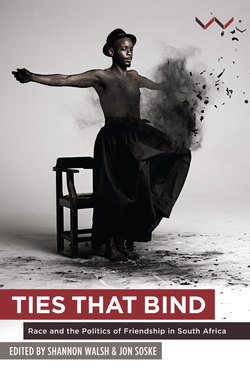Читать книгу Ties that Bind - Shannon Walsh - Страница 10
На сайте Литреса книга снята с продажи.
‘FRIEND OF THE NATIVE’
ОглавлениеAs a discourse and idea, friendship between colonizer and colonized played a number of different, if sometimes overlapping, roles in South Africa during the late nineteenth and twentieth centuries. It provided a flexible language for the articulation and development of social solidarity across multiple sites, including the mission station, liberal organizations such as the Joint Councils movement and the South African Institute of Race Relations, trade unions, colonial commissions, cultural organizations, and the personal relationships that developed in these spaces. In this sense, the term ‘friend’ possessed an ambiguity that historians have noted in other contexts: it could refer both to a privileged, intimate relationship and to a broader range of social acquaintances (Caine 2011). Overlapping with a Christian discourse of universal friendship, this language circulated alongside related terms such as brotherhood (indicating the gendered character of the discourse), cooperation (which became Colonial Office policy in the 1940s), and — in the language of the international labor movement — solidarity. As illustrated through Smuts’s insistence on the primacy of white unity, this rhetoric informed a significant debate over where friendship should begin and the boundaries created by affective social ties. In the face of the colonized, settler nationalism frequently insisted on the sanctity of European brotherhood (see Tallie in this volume).
The intersection of race and friendship reinforced an element of racialized performance in South African life and politics. The dominant framework for staging the relationship between colonizer and colonized, both in South Africa and throughout the British Empire, was white paternalism: the patriarchal and heteronormative family provided the template for the affective dimensions of the colonial relationship (Nandy 1983). To a certain degree, liberal efforts to stage the friendship between black and white (such as the Joint Councils movement of the 1930s, and the liberal tea parties frequently mocked in the writings of black authors) sought to reconfigure this performance in order to create an image of equality. As BC leader Biko (2004) argued, this dramaturgy transformed black bodies into symbols of white enlightenment. The presence of Africans in liberal spaces lent them legitimacy. Inversely, some liberal activists urged the visibility of whites within black spaces and movements in order to reinforce their ‘peaceful’ and ‘civilized’ character. According to this conception, the presence of whites would break down preconceptions and resentments, thus guarding against the development of (an ostensibly exclusionary) African nationalism. It was in this sense that the liberal newspaper of the 1950s was entitled Contact (Soske 2015).
Liberal trusteeship, the civilized labor policy, and the ideology of indirect rule each implied the eventual entrance of Africans into modern civil society (or civilization) even as this outcome was deferred indefinitely and undermined in practice. The conceptualization of the Native Question also framed a theory of African nationalism. If the success of colonial friendship manifested in the gratitude of the native, the independent political organization of Africans was seen as symptomatic of a profound failure. In the eyes of Schreiner and Smuts, the policy of exploitation, by eroding the promise of a common future, drove the oppressed to a rejection of friendship. This narrative found its highest expression in Alan Paton’s 1948 novel Cry the Beloved County and the 1940s liberal trope of the South African tragedy. Echoing Schreiner and Smuts, Paton (1948: 250) projected the dreaded reversal into the mouth of an African character: ‘I have one great fear in my heart, that one day when they turn to loving they will find that we are turned to hating.’ Stripped of independent historical trajectory, native agency was reduced to the embrace or rejection of white society.
From its inception, African nationalism developed a critical understanding of the discourse of liberal friendship. In the early decades of the ANC, leaders sought entrance for ‘civilized Africans’ into a common society with settlers, even as they frequently challenged the way that civilization and the capacity for citizenship was defined (Limb 2010). At the same time, nationalist intellectuals rejected white trusteeship in the name of African unity and agency (Butler 2013). Whatever their other differences, most African thinkers agreed that a truly universal civilization would not come through the graces of colonial assimilation, but necessitated the struggle of Africans to build a national identity and their own modern institutions. On this basis, Africans would enter modernity on their own terms and meet whites as equals. The critical embrace of civil society reproduced aspects of anti-blackness even as it articulated an African political subject in opposition to white supremacy (see Barchiesi in this volume). It also generated a profoundly conflictual relationship with the liberal friend of the native. Even as figures such as John Dube, the first president of the ANC, struggled to create the foundations of an independent African intellectual and social life, they relied on the patronage of white benefactors who constrained and occasionally sabotaged their activities (Hughes 2011). Although it was often expressed in private letters or within black-only spaces, the critique of the liberal friend was not an innovation of the ANC Youth League intellectual Anton Lembede or Biko, but an integral part of African political thinking. As ANC president Albert Luthuli (1991: 166) declared in 1960:
The formation of the Union of South Africa saw the beginning of the defeat of liberalism as expressed by so-called Cape liberals of the day. Because of its paternalism, many non-whites will not regret the demise of such liberalism. The issues of the struggle for freedom and democracy by non-whites are now so clear cut as to admit of no confusing assistance from our friends of the liberal paternalistic outlook who often advocate a timeless gradualism. This has sometimes provoked the cry, ‘oh, save us from our friends’.
